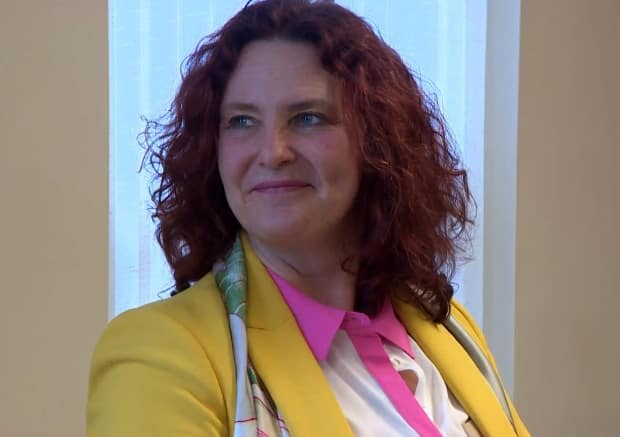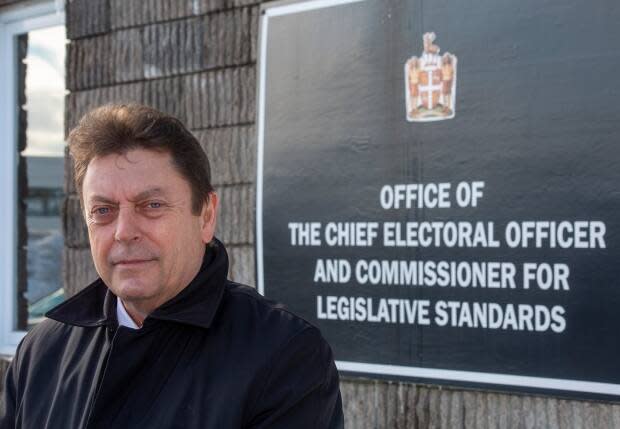NDP leader's court challenge demands election results be tossed out


The defeated head of Newfoundland and Labrador's New Democratic Party is leading the charge in a legal action demanding last month's election results be thrown out and a new vote ordered.
Alison Coffin and another applicant, a St. John's resident who claims he was denied the right to vote, jointly filed a court challenge Monday containing scathing accusations against Newfoundland and Labrador's elections agency, alleging widespread and illegal mishandling of the electoral process and demanding the province's Supreme Court void the election's outcome.
The 45-page application — a separate challenge from the one that Coffin filed earlier this month, requesting a vote recount in her district — argues that the process employed by Elections NL discriminated against voters on the basis of ethnicity, age or disability, disproportionately excluding people without access to the internet and people in Indigenous communities.
"We need to know what happened in this election to ensure that it does not go wrong in the next election," Coffin said Monday. "That is the impetus for this action today."
NDP provincial president Kyle Rees clarified Monday afternoon the application will target the St. John's East-Quidi Vidi district. Liberal candidate John Abbott unseated Coffin by 53 votes.
"We are specifically bringing evidence related to that district, but there's no reason why the lessons that we learn from this district … can't be applied broadly across the province," said Rees, adding that a judge could overturn results in all 40 districts based on this application.
In addition to voiding results, the application demands an unspecified payment of damages to the joint applicants.
The application specifically names Elections NL head Bruce Chaulk as a respondent, alleging that Chaulk "failed to discharge [his legal] duties in the manner required of him, most notably with respect to his duty to ensure that the election proceeded with fairness, impartiality, and in compliance with the [Elections] Act, and that [Chaulk] failed to act in good faith."
Abbott, now the Liberal MHA for St. John's East-Quidi Vidi, is also named in the application as a respondent, alongside returning electoral officer Sherry Morrissey.
In the document reviewed by CBC News, Coffin submitted an affidavit alleging that she heard from more than one registered voter who requested a ballot and did not receive one, and that there were "many individuals" who were added to the voters' list by phone "without being properly sworn and providing proper identification."

Coffin's co-applicant, Whymarrh Whitby of St. John's, also swore an affidavit saying that he submitted a request for a special ballot on Feb. 13, just hours after chief electoral officer Bruce Chaulk cancelled in-person voting.
Whitby says he did not receive a ballot before the deadline to return votes to the elections agency, and therefore was denied his right to vote.
"I waited, as everyone did, to get their ballot," Whitby said. "Mine didn't come."
Whitby alleges he called the agency twice in the days leading up to that deadline but was not called back and was not offered an alternative means to vote.
Application alleges illegally issued ballots, obstruction of scrutineer duty
The document lists 28 specific "irregularities," any one of which it says "would be sufficient to call into question the validity of the results of an election."
That list includes Chaulk's decision to hand-deliver ballots, including to at least two candidates: former PC leader Ches Crosbie and Liberal cabinet minister Siobhan Coady.
The application also alleges that the process of issuing ballots broke the law, and contains an affidavit from a special ballot co-ordinator, who claims officials processed a "large number" of ballot requests by phone and observed elections staff mailing ballots without verifying the identity of the voter.
Some callers also requested ballots for family members, although it wasn't confirmed any family members lived at the given address, that affidavit said.
Jud Vanta, an experienced NDP scrutineer, claimed in another affidavit that she was prevented from fully observing the act of vote-counting by COVID-19 restrictions, and was not permitted to look at vote tallies or summaries.
"When I tried to view these tally and summary sheets, Elections NL staff would shield the papers from view with their bodies," Vanta's statement says.
Vanta, who described encountering various other obstructions in trying to carry out her duties, said she was later permitted to review some summary sheets, and noticed at least one tallying error when she did so.
She also described seeing a number of rejected ballots she believed did not qualify as spoilage.
At least 1,337 ballots were rejected, according to data published Monday by the Newfoundland and Labrador Gazette, the official publication of the provincial government. In comparison, Elections NL rejected 899 ballots in the 2015 election.
The election workers and the voter named in the application have all turned down requests for interviews with CBC News.

In her own legal statement, Coffin outlined various other grievances with the election, including "multiple extensions of the writ period, the failure of [Chaulk] to facilitate in-person voting on polling day, [and] multiple changes to voting day," as well as Chaulk's refusal to meet with the party to discuss these concerns.
Chaulk said at the time his office was an independent institution that "will not become involved in political partisanship between the parties."
The chief electoral officer continues to refuse all interview requests from CBC. He has not granted an interview to the public broadcaster since early March.
In a statement Monday, Elections NL said it "will file its own legal argument in response" if the application is accepted.
If the application succeeds, the court will likely set a date to put it before a judge, who will then determine next steps, including the date of a formal hearing.
NDP calls challenge a 'duty'
Immediately after filing the application, Coffin and Rees addressed reporters, defending their submission by framing it as an act of "duty" to electors frustrated by obstacles to voting at every turn.
Rees said a court challenge supplied benefits that other avenues did not, including legally compelling respondents to speak to the raised issues.

"We filed an application to declare a controverted election. It's a very rare and unique sort of application that doesn't have a lot of precedent in this province," Rees said.
"We filed this application because we had to. We didn't file it because we're upset we didn't win the election."

 Yahoo Movies
Yahoo Movies 
